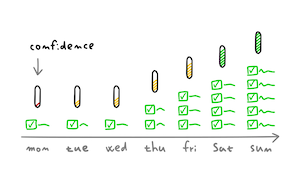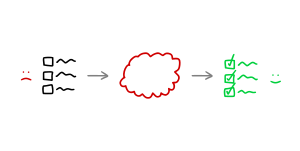How to make work less boring
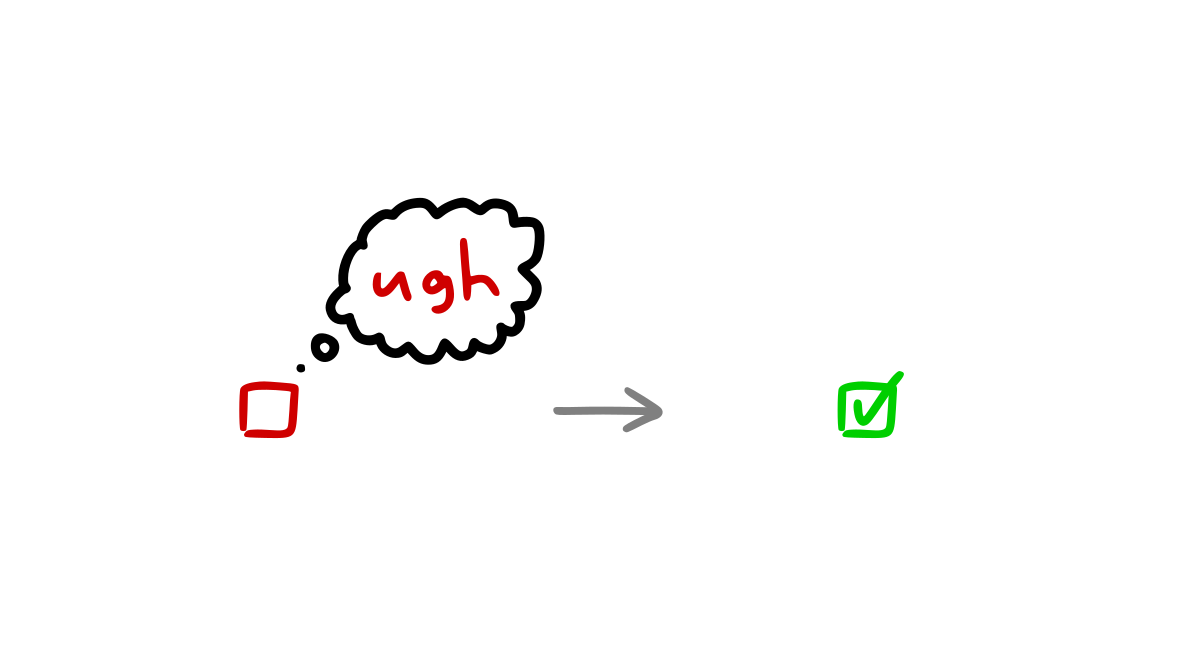
Most of us want to be engaged at work and enjoy the process.
Yet, many of us aren't. Work feels like work, not like play. It feels like a chore, not like an interesting fun activity.
While it's probably unrealistic that we'll enjoy 100% of our responsibilities, it's extremely realistic to take the number to 60-80%.
This blog post will help you get the less interesting parts of your work done.
We'll show you how you can change the context of your work (without changing the content) and feel less bored, more engaged, and ultimately more successful.
To understand how, let's take a look at a useful term you might already know.
Enter flow
What's the Holy Grail of engaging activities?
Flow:
a flow state, also known colloquially as being in the zone, is the mental state in which a person performing an activity is fully immersed in a feeling of energized focus, full involvement, and enjoyment in the process of the activity
A flow state is a mental state that is intrinsically motivating to us.
When in flow, our brains produce an array of feel-good neurochemicals. Flow is awesome. Flow is addictive. Flow is the reason why some people really enjoy working.
You might be asking now: how do I get into this magical state?
There are a couple key ingredients:
- Clear goal
- Immediate feedback
- A high level of concentration
- A feeling of control
- Balance between skills and challenge
All matter, but we'll focus on the last point. We get into flow when we’re optimally challenged.
According to an estimate by Steven Kotler, a flow researcher and author, to get into flow the task should be about 4 % harder than our current ability.
When the task is challenging just enough, we enter the Flow Zone.

If a task is too challenging for you, you get anxious. For example, writing a thesis can induce anxiety and be overwhelming if you've never done it before. We'll cover this some other time.
On the other hand, if something is not challenging enough, you get bored. For example, everyday chores like tidying up, filling out expense reports, or doing homework fall into this category.
Ideally, we want to get into flow when working, but what if we can't? What if some conditions aren't met?
Even if we don’t get into the Flow Zone, we can still do work in a more enjoyable state of mind and get into what we call the Engagement Zone.
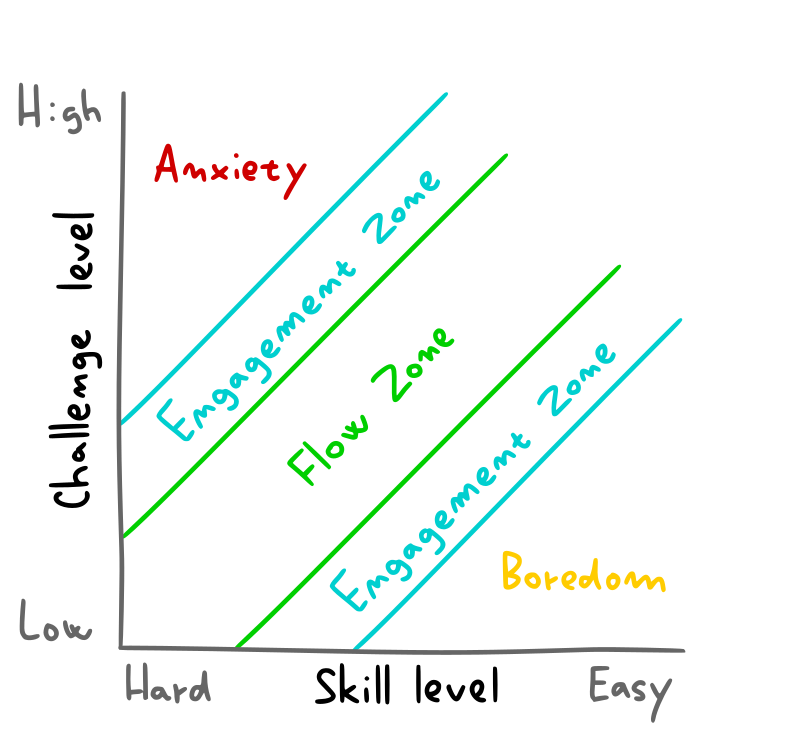
The Engagement Zone means that you're engaged. You're not ecstatic, but you're also not bored, disengaged, or unmotivated.
Now let's dive into how you can get from bored to engaged (and sometimes even into flow.)
1. Get bored to get curious about your work
Try this: Spend 2 hours on any social media platform and then immediately go focus on your most difficult work.
That’s a hard transition. You'll likely fail.
Our brain is too overstimulated by the flood of incoming information. New messages, new notifications, new news,...
Occasional browsing of social media or watching one YouTube video is not an issue. It's slightly distracting, but the feeling naturally fades away after making a cup of coffee, a minute or 2 of staring out of a window, or going for a walk (simply not consuming anything and getting bored).
However, when we scroll for hours or binge-watch a show, we get into a different brain space. We feel lazier. We don’t feel like doing anything.
Suddenly everything besides social media or games seems boring and hard, including any productive work.
It’s because we get a lot of dopamine without any effort. A lot of mental stimulation in a short amount of time. This increases our dopamine threshold.
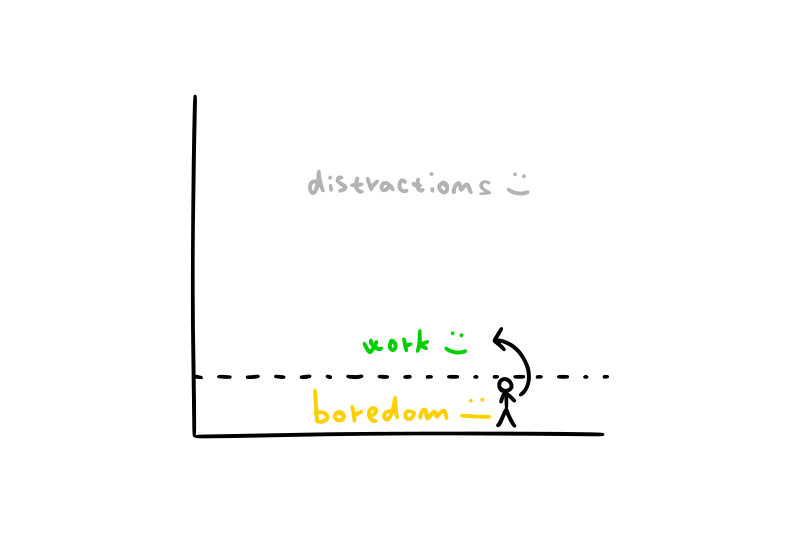
It can kill our curiosity and interest in our own work.
The first step to making work more engaging is to not overstimulate your mind. In other words, to get bored more often.
When you find yourself bored, don't immediately reach for your phone.
If you have to, read a blog post or a few pages of a book.
Over time, allowing yourself to be bored and let your mind wander will help you get naturally more interested in work. If you have nothing to do, you might as well do a bit of work, right?
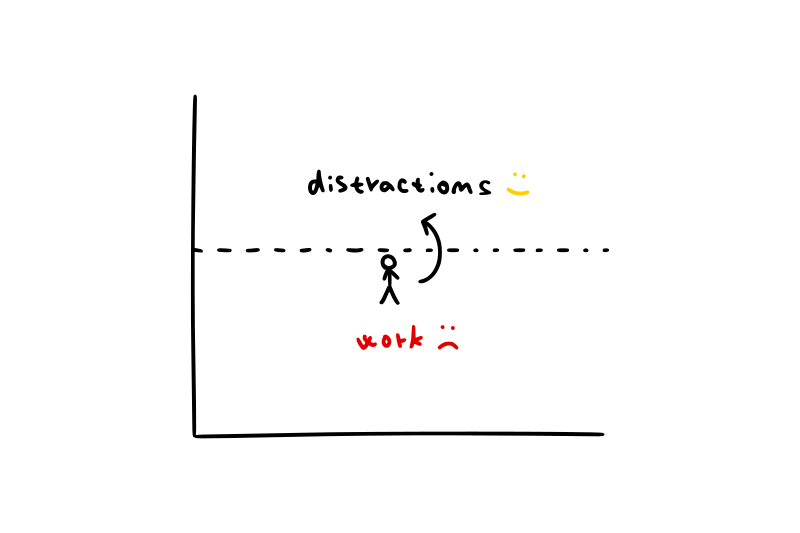
Fortunately, once we start, we often get into the work and distractions will become less luring.
Getting bored will lower your dopamine threshold and make you naturally be more curious about work.
But what if work still doesn't seem interesting or fun?
2. Find meaning in the work
It's hard to feel motivated when you don't have a personal reason to do something.
Sometimes, you find the work boring because you don’t find any value in doing it. You might view it as a chore, something you "have to do." This framing does not help.
Let’s say you have to study for an exam. You don’t find this particular class enjoyable. If you remind yourself why you chose to take the class and why studying is important for you, you will have an easier time persuading yourself to push through.
If you struggle with the feeling of having to do this and that all the time, we covered it much more extensively in our guide in the chapter on the Inner Dictator.
The fact is that some things simply need to be done. It's better if you find a compelling reason to do them and get them over with as soon as possible instead of putting them off forever.
3. Challenge yourself
If something is too easy, we can make it artificially more difficult. You can add extra constraints to make it more challenging.
The constraints can be anything: time restrictions (Can I get this done in 5 minutes? Can I do this before my next call?), using the left hand instead of the right hand, or doing as much as you can without additional research.
Do you need to write a boring report? Challenge yourself to not use "and" in it.
Need to wash the dishes? Can you get it done in under 10 minutes?
Need to answer some emails? Bet a snack that you'll answer more than your co-worker in 30 minutes.
There are unlimited challenges that you can come up with. They can turn what used to be chores into outright fun, especially if you involve others.
4. Find your productive combos
Work is boring when we're using only a small portion of our brain capacity. There's extra capacity left.
Well, we can use it for something else and create a fun combo.
Example:
Vita here. I’ve been coding for years now. Some tasks like basic web style changes are just boring to me. I don’t enjoy making those and testing if they work.
That is, I don’t enjoy making those changes without a podcast playing in the background.
When I’m listening to an interview and working, I get into flow. I forget about time. I code and follow the conversation. I’m engaged, I’m enjoying the process.
Productive Combo #1: Light coding + Podcast
And I’ve found other combos that make work fun for me:
- Podcast + light coding
- Podcast + drawing / graphics
- Podcast + working out
- Music + “heavy” coding
- Music + writing
- Walking + problem solving
- Cycling + problem solving
- Manual work + problem solving
All these combos help me get things done and sometimes even lead into flow.
What are your “productive combos”? Could you add music to something? Could you listen to an interview? Could you watch a movie while painting your room?
Caution:
Don’t try to pair two activities that are too challenging. For example, when I do any logic-heavy coding, I listen to music or not even that. I’ve also found that I can’t follow an interview while writing (both use the same parts of the brain). Ideally pair activities that don’t use the same parts of the brain: audio + visual, manual work + audio, tidying + movie,...
Summary
Boring tasks don't need to stay boring and haunt you for weeks. You can make small adjustments to your workflow that will move you from Boredom to the Engagement Zone.

- Allow yourself to let your mind wander instead of reaching for endless distractions
- Find a personal reason to do the task
- Challenge yourself
- Find your productive combos
Use any of these tips to make work more enjoyable for you today!

